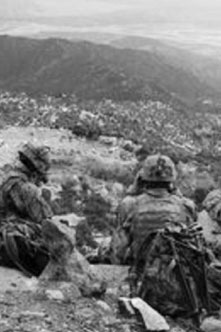Deutsch
Mit großer Mehrheit hat der Bundestag am 28. 1. 2011 das neue Afghanistan-Mandat der Bundeswehr beschlossen. 420 Abgeordnete votierten für die Verlängerung des Mandats um ein Jahr bis zum 31. 1. 2012, 116 dagegen. 43 Parlamentarier enthielten sich. Erstmals ist ein Termin für den Beginn des Abzugs festgeschrieben: Ende 2011, wenn es die Lage erlaubt. Außenminister Guido Westerwelle sprach von einer »Zäsur«.
Das Mandat stellt für den Beginn des Abzugs die Bedingung, dass die Sicherheitslage vor Ort einen Abzug erlauben muss und die verbleibenden Soldaten dadurch nicht gefährdet werden dürfen. Die Mandatsobergrenze von 5.000 Soldaten plus einer Reserve von 350 Soldaten am Hindukusch bleibt unverändert. Derzeit sind knapp 4.900 deutsche Soldaten dort im Einsatz. Insgesamt 45 Bundeswehrsoldaten kamen seit 2002 in Afghanistan ums Leben. Die NATO will den Kampfeinsatz bis Ende 2014 beenden.
Georg Katzer
Mein Verhältnis zum politischen Lied ist vorbelastet durch meine Erfahrung in der DDR, wo politische Lobsänger mit Massenliedern eine lukrative Kreativität entwickelten. Die Lieder waren für Massen gedacht und sollten auch (möglichst) von ihnen gesungen werden, sie mussten entsprechend simpel sein. Ihr Zweck war eine politische Meinungslenkung. Mir stellt sich die Frage, inwieweit politisch engagierte Musik den Hörer nicht nur im physikalischen Sinne erreicht, sondern in sein Bewusstsein eindringt. Wenn ein Stück politischer Musik kein Vergnügen hervorruft, dann verpufft auch die Botschaft. Welche Zugeständnisse an den Massengeschmack darf man machen?
Nachdem ich mich über die vielen Jahre meines Komponierens verschiedener Verfahren bedient habe – Dodekaphonie, Serialistik, Aleatorik, Modalistik etc. –, habe ich mich von der Theorie entfernt. Die Theorie war insofern entlastend, als man sich nicht bei jedem Ton die Frage nach seiner Berechtigung stellen musste: Die Verantwor-tung war einem Konstrukt übertragen. Selbstverständlich haben alle die »Istiken« Spuren in meinem musikalischen Denken hinterlassen. Aber letztendlich entscheidet das Vergnügen am Klang – der kann ein A-Dur sein oder auch ein kratzendes Geräusch.
English
The German Federal Parliament approved the new Afghanistan mandate on January 28 2011 by a large majority. Four hundred and twenty delegates voted for an extension of the mandate of one year until January 31 2012, one hundred and sixteen voted against it. Forty three parliamentarians abstained. For the first time a date was set to begin the withdrawal at the end of 2011, if circumstances allow. Foreign Minister Guido Westerwelle spoke of a ›caesura‹.
The mandate is also based on the condition that the local security situation must allow for a withdrawal and that the soldiers who remain must not be put at risk. The upper limit of the mandate, a maximum of 5,000 soldiers plus a reserve of 350 deployed in the Hindu Kush, remains unchanged. Currently, just under 4,900 soldiers are in action there. Altogether 45 Bundeswehr soldiers have been killed in Afghanistan since 2002. NATO intends to end the combat mission by the end of 2014.
Georg Katzer
My relationship with the political song is handicapped by my experiences in the GDR where political praise singers turned songs for the masses into profitable creativity. These songs were aimed at the masses, were (preferably) meant to be sung by them, and therefore had to be simple. Their purpose was to control political opinions. I ask myself how politically engaged music reaches the listener not only in a physical sense, but also by infiltrating his consciousness. If a piece of political music does not create pleasure, its message dissolves. What kinds of concession should we make to the taste of the masses?
After making use of diverse composing techniques over the course of many years – dodecaphony, serialism, aleatoric music, modal composition, etc. – I distanced myself from theory. Theories are a relief because you don’t have to ask yourself about the legitimacy of each note: that responsibility can be transferred to the construct. Naturally, all these ›isms‹ have left their traces in my musical thinking, but in the end it is the pleasure in the sound that is crucial, and that can be an A major or a scratchy noise.
Quellen / sources: www.spiegel.de de.statista.com (Letzter Zugriff / last access: 10. 2. 2011)
